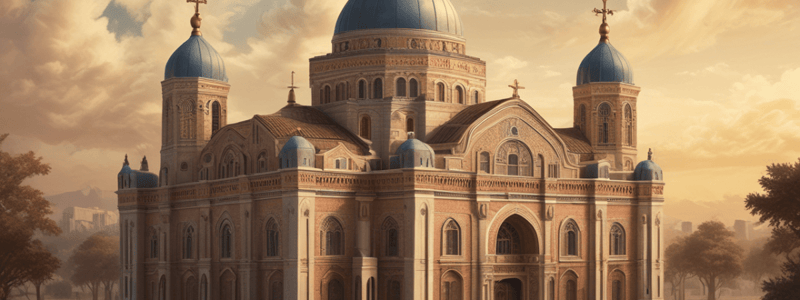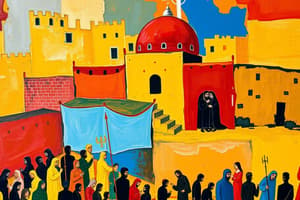Podcast
Questions and Answers
What was the main reason behind the schism caused by the council of Chalcedon?
What was the main reason behind the schism caused by the council of Chalcedon?
- Pride and love of primacy (correct)
- Pope Dioscorus' disagreement with the Emperor
- Theological differences between the Eastern and Oriental Orthodox Churches
- The refusal of Pope Dioscorus to sign Leo's tome
Where was Pope Dioscorus exiled to after his departure?
Where was Pope Dioscorus exiled to after his departure?
- The City of Alexandria
- The Island of Gangra (correct)
- The City of Edko
- The Island of Patmos
What was the term used to describe the Churches that do not accept the Council of Chalcedon?
What was the term used to describe the Churches that do not accept the Council of Chalcedon?
- The Eastern Orthodox Churches
- The Oriental Orthodox Churches (correct)
- The Chalcedonian Churches
- The Non-Oriental Orthodox Churches
What was Pope Dioscorus' response to the Tome of Leo?
What was Pope Dioscorus' response to the Tome of Leo?
What was the significance of the common statement of faith signed by the Patriarchs of both Orthodox families?
What was the significance of the common statement of faith signed by the Patriarchs of both Orthodox families?
Flashcards are hidden until you start studying
Study Notes
The Coptic Orthodox Church
- The Coptic Orthodox Church is an Egyptian church with "Coptic" meaning "Egyptian" and "Orthodox" meaning straight in faith.
St. Mark the Apostle
- Preached Christianity to the Copts, who remained faithful in the faith, holding fast to the teachings, rites, and Holy Tradition received from him.
Early Centuries of the Church
- Many heresies arose due to incorrect interpretation of Bible verses, leading to the need for councils to discuss and refute them.
- Two types of councils: Local or provincial councils and Ecumenical councils.
- The Coptic Orthodox Church recognizes 3 ecumenical councils:
- The Council of Nicaea (325 AD)
- The Council of Constantinople (381 AD)
- The Council of Ephesus (431 AD)
Pope Dioscorus Defends the Faith
- Presided over the Second Council of Ephesus (449 AD) to look into the teaching of Eutychus.
- Eutychus taught that the humanity of Christ was not similar to our humanity and was consumed by His divine nature.
- Pope Dioscorus defended the Orthodox teaching that the Lord Jesus' incarnate nature is one nature out of two, without mingling, confusion, or alteration.
The Second Council of Ephesus
- Held to look into Eutychus' request to be returned to the church after being excommunicated.
- Decisions of the Council:
- Restored Eutychus to the Church after his declaration of the true Orthodox faith.
- Excommunicated Flavian of Constantinople due to his Nestorian belief.
- Later, Eutychus returned to his initial false teachings and was anathematized.
The Council of Chalcedon
- Reason for the Council: The Bishop of Rome did not accept the results of the Second Council of Ephesus.
- Decisions of the Council:
- Canceled the decisions of the Second Council of Ephesus.
- Gave absolution to Flavian of Constantinople.
- Excommunicated Eutychus despite his confession of the Nicene Creed.
- Excommunicated Pope Dioscorus and sent him to exile after accusing him of believing in Eutychus' heresy.
Consequences of the Council of Chalcedon
- Led to a schism in the Church, splitting the Church into Chalcedonian and Non-Chalcedonian Churches.
- The Non-Chalcedonian Churches are:
- The Church of Alexandria (The Coptic Church)
- The Armenian Church
- The Ethiopian Church
- The Eritrean Church
- The Syriac Church
- The Indian Orthodox Church (Malankara Orthodox Church)
- The Chalcedonian Churches are mainly the Catholic and Eastern Orthodox Churches.
Pope Dioscorus
- Place of birth: Alexandria
- Length of papacy: 10 years, 1 month, and 9 days
- Departure: Departed while in exile on the island of Gangra on the 7th of Thoout.
- Defended the faith against heresies and divisions of the church.
- Faced the emperor and empress, expressing the true Orthodox faith, leading to his exile and mistreatment.
Studying That Suits You
Use AI to generate personalized quizzes and flashcards to suit your learning preferences.




